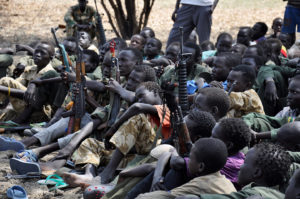by WorldTribune Staff, June 13, 2016
Hillary Clinton has long positioned herself as a champion for children’s rights, but during her tenure atop the U.S. State Department she helped pave the way for South Sudan to continue sending child soldiers to fight and die on the front-lines of its battles.
“Clinton had spent years vowing to defend the rights of children worldwide — in 2012, she railed against ‘modern-day slavery’ in the introduction to a State Department report on human trafficking that took aim at the ‘unlawful recruitment or use of children’ by armed forces,” a report by Nick Turse in The Intercept said.

/Samir Bol/Anadolu Agency/Getty Images
“Yet she does not appear to have publicly explained her role in allowing South Sudan and other countries to receive military support despite using children as combatants.”
In 2008, the United States passed the Child Soldiers Prevention Act (CSPA) that prohibited U.S. military aid to countries that use child soldiers. After South Sudan won independence, however, the Obama administration issued annual waivers that “kept aid flowing to the world’s newest nation despite its use of child soldiers,” the Intercept report said.
Clinton played a key role in issuing the waivers, sources said.
The CSPA waivers issued on Clinton’s watch “and the broader panoply of military and diplomatic support that was extended to South Sudan and the government of its president, Salva Kiir, failed to prevent a descent into violence that has cost more than 50,000 lives and forced more than 2.4 million people to flee their homes,” the report said.
In 2011 Clinton spoke at a conference on South Sudan about “the opportunity to make it possible for [South Sudan’s] children to envision a different future.” The same year, the Obama administration “used a technicality to gain a CSPA exemption for South Sudan, since the list of countries subject to the law that year was created before the new nation became independent.”
“There would be no ‘different future’ for South Sudan’s child soldiers in 2011, nor the next year, when the White House issued a waiver for South Sudan.”
Daniel Mahanty, who served in the Bureau of Democracy, Human Rights, and Labor under Clinton, confirmed to The Intercept that “the State Department, in consultation with the White House, controlled the process. The State Department drafted all waiver materials and all recommendations to the president were made on behalf of the secretary of state and with her full approval.”
“We will have already drafted the letter from the president to Congress that says what waivers he’s going to invoke,” Mahanty said. “So it goes up to the secretary [of state], then over to the White House, and from the White House out to the public.”
Jo Becker, the advocacy director of the children’s rights division at Human Rights Watch, also told The Intercept that Clinton’s State Department played a central role. “It’s the State Department that gives the recommendations to Obama on who he should waive,” she said.
In a September 25, 2012, speech before the Clinton Global Initiative, Obama spoke about an issue that he said “ought to concern every nation. … I’m talking about the injustice, the outrage, of human trafficking, which must be called by its true name — modern slavery.” The president added, “When a little boy is kidnapped, turned into a child soldier, forced to kill or be killed — that’s slavery. … It is barbaric, and it is evil, and it has no place in a civilized world.”
Three days later, Obama issued a CSPA waiver for South Sudan.
“A waiver allowed the United States government’s continued delivery of necessary assistance to ensure security sector reform,” a White House official said. “This assistance, which provided training on human rights and protection of children, was also designed to help increase the military’s command and control capacity, which in turn increased its ability to prevent and eliminate child soldiers in its ranks.”
“But the latter never happened,” Turse reported, adding that “child soldiers remained in the military as U.S. aid kept flowing to the Sudan People’s Liberation Army, or SPLA, and into the coffers of President Kiir’s government, almost $620 million in U.S. assistance in 2012. In 2013, U.S. aid topped out at more than $556 million. That September, Obama issued another CSPA waiver — this time in the form of a memorandum to new Secretary of State John Kerry.”
“The U.S. seems to make the same kind of mistake again and again,” said Nate Haken of the Fund for Peace. “We catalyze major change without understanding, or at least grappling with, the long-term implications — whether it’s Iraq or Libya or whether it’s South Sudan. We definitely need to do better.”
